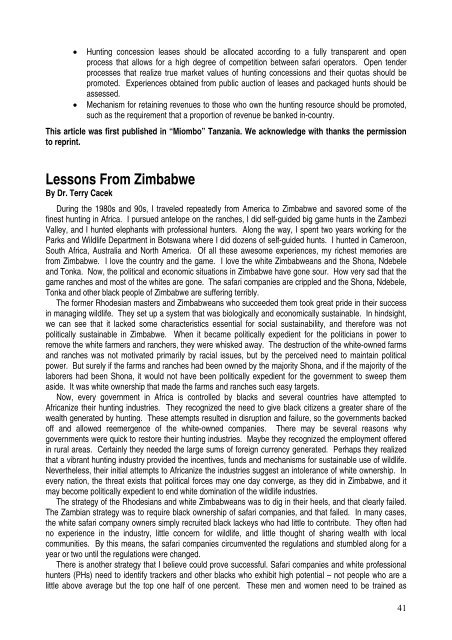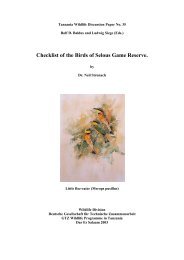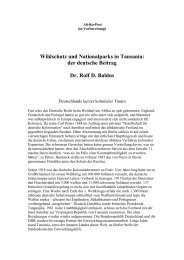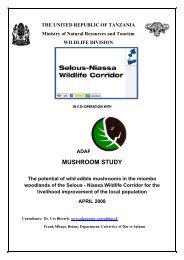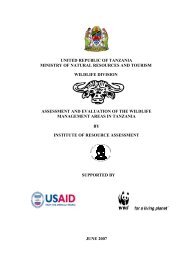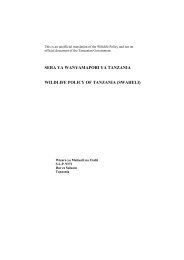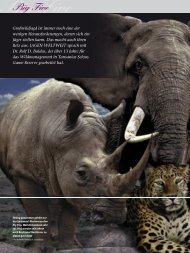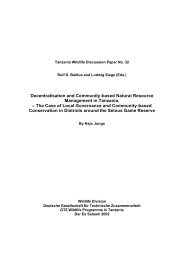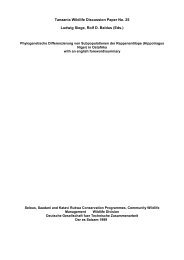African Indaba Articles - wildlife-baldus.com
African Indaba Articles - wildlife-baldus.com
African Indaba Articles - wildlife-baldus.com
You also want an ePaper? Increase the reach of your titles
YUMPU automatically turns print PDFs into web optimized ePapers that Google loves.
• Hunting concession leases should be allocated according to a fully transparent and openprocess that allows for a high degree of <strong>com</strong>petition between safari operators. Open tenderprocesses that realize true market values of hunting concessions and their quotas should bepromoted. Experiences obtained from public auction of leases and packaged hunts should beassessed.• Mechanism for retaining revenues to those who own the hunting resource should be promoted,such as the requirement that a proportion of revenue be banked in-country.This article was first published in “Miombo” Tanzania. We acknowledge with thanks the permissionto reprint.Lessons From ZimbabweBy Dr. Terry CacekDuring the 1980s and 90s, I traveled repeatedly from America to Zimbabwe and savored some of thefinest hunting in Africa. I pursued antelope on the ranches, I did self-guided big game hunts in the ZambeziValley, and I hunted elephants with professional hunters. Along the way, I spent two years working for theParks and Wildlife Department in Botswana where I did dozens of self-guided hunts. I hunted in Cameroon,South Africa, Australia and North America. Of all these awesome experiences, my richest memories arefrom Zimbabwe. I love the country and the game. I love the white Zimbabweans and the Shona, Ndebeleand Tonka. Now, the political and economic situations in Zimbabwe have gone sour. How very sad that thegame ranches and most of the whites are gone. The safari <strong>com</strong>panies are crippled and the Shona, Ndebele,Tonka and other black people of Zimbabwe are suffering terribly.The former Rhodesian masters and Zimbabweans who succeeded them took great pride in their successin managing <strong>wildlife</strong>. They set up a system that was biologically and economically sustainable. In hindsight,we can see that it lacked some characteristics essential for social sustainability, and therefore was notpolitically sustainable in Zimbabwe. When it became politically expedient for the politicians in power toremove the white farmers and ranchers, they were whisked away. The destruction of the white-owned farmsand ranches was not motivated primarily by racial issues, but by the perceived need to maintain politicalpower. But surely if the farms and ranches had been owned by the majority Shona, and if the majority of thelaborers had been Shona, it would not have been politically expedient for the government to sweep themaside. It was white ownership that made the farms and ranches such easy targets.Now, every government in Africa is controlled by blacks and several countries have attempted to<strong>African</strong>ize their hunting industries. They recognized the need to give black citizens a greater share of thewealth generated by hunting. These attempts resulted in disruption and failure, so the governments backedoff and allowed reemergence of the white-owned <strong>com</strong>panies. There may be several reasons whygovernments were quick to restore their hunting industries. Maybe they recognized the employment offeredin rural areas. Certainly they needed the large sums of foreign currency generated. Perhaps they realizedthat a vibrant hunting industry provided the incentives, funds and mechanisms for sustainable use of <strong>wildlife</strong>.Nevertheless, their initial attempts to <strong>African</strong>ize the industries suggest an intolerance of white ownership. Inevery nation, the threat exists that political forces may one day converge, as they did in Zimbabwe, and itmay be<strong>com</strong>e politically expedient to end white domination of the <strong>wildlife</strong> industries.The strategy of the Rhodesians and white Zimbabweans was to dig in their heels, and that clearly failed.The Zambian strategy was to require black ownership of safari <strong>com</strong>panies, and that failed. In many cases,the white safari <strong>com</strong>pany owners simply recruited black lackeys who had little to contribute. They often hadno experience in the industry, little concern for <strong>wildlife</strong>, and little thought of sharing wealth with local<strong>com</strong>munities. By this means, the safari <strong>com</strong>panies circumvented the regulations and stumbled along for ayear or two until the regulations were changed.There is another strategy that I believe could prove successful. Safari <strong>com</strong>panies and white professionalhunters (PHs) need to identify trackers and other blacks who exhibit high potential – not people who are alittle above average but the top one half of one percent. These men and women need to be trained as41


